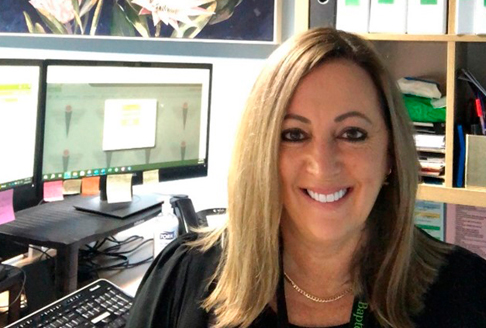We originally reached out to Lia for a Faces of Baptcare profile because her Manager, Residential Care Services Manager (RCSM), Trent Baxter, mentioned Lia’s interesting career journey. During our chat, Lia also generously shared her personal lived experience of family domestic violence. Our aim in doing these Faces of Baptcare profiles is to shine a light on the stories of our amazing workforce who never cease to surprise and inspire us. Lia is a living example of this mission in action, and we are so proud to have her in our community, a sentiment echoed by RCSM Trent Baxter in his comments below.
“Lia is a person of utmost integrity, placing a high value on honesty in all aspects of her life. Lia’s exceptional clinical knowledge has made a significant positive impact on Baptcare Karingal Community, our residents and our services. Lia’s unwavering dedication and passion for ensuring our clinical governance exceeds expectations led to amazing praise during our 2023 accreditation visit and Baptcare Karingal Community’s consistent 5-star rating for Governance and Quality measures. Beyond her professional expertise, tough exterior and to-the-point approach, Lia possesses a heart of gold, consistently demonstrating compassion and empathy towards her colleagues and those in need. We are fortunate to have Lia as part of our team.”
And now, let’s hear from Lia herself.
What is your role at Baptcare and what does it involve day to day?
Since I commenced working for Baptcare in 2021, I have been in the Clinical Outcomes Partner Role. I lead the clinical team of three nurse unit managers and their wings. Some tasks in my role include nurse recruitment, quality improvement, trending incident analysis, auditing, monitoring quality care, and consumer outcomes. I also fill in as facility manager/Residential Care and Services Manager (RCSM) in Trent’s absence. My role has just changed to Assistant Residential Care & Services Manager (ARCSM) where I will continue with my current tasks with some added responsibilities.
What made you change careers from hairdressing to working at Baptcare?
When I first left school I became a hairdresser, which led me to a life of fancy hairdos, loads of makeup, and lots of socialising. This was a fun time in my early adult life and eventually, I owned and managed my own salon. My change to nursing came about under not very good circumstances. I was married and living in a domestic violence relationship which ended with police involvement and the domestic violence crisis team hiding me in Western Australia for three months. This was until I was mentally strong enough to come back to Tasmania, lay charges, and go through the whole Supreme Court process. This process resulted in my ex-husband receiving a two-year jail term. It was a very traumatic time in my life but what doesn’t kill you makes you stronger, so they say.
Moving forward I set three goals for myself: One, to lose weight and be healthier. Two, to become a nurse and work in an Intensive Care Unit (ICU). Three, to build two units.
I was juggling being a single mum of two beautiful girls and still managed to achieve all three of my goals. My nursing career started in theatre, then surgical ward, and then in Intensive Care (ICU). I then became a Care Manager in another residential aged care facility, before being promoted to Facility/General Manager seven months later. This was no easy task as six weeks later the COVID pandemic occurred. After pushing myself to my limit during the pandemic, I resigned from managing that RAC and came to work at Baptcare Karingal in the Clinical Outcomes Partner role.
Given your lived experience, what are your thoughts on days like White Ribbon Day and the 16 days of Activism?
I believe that awareness is very important and due to my experience, I always hope days like White Ribbon Day and the 16 days of Activism will help to raise the importance of keeping women and children safe. However, I would like to say that as much as these important events exist to help stop men’s violence against women, I would like to note that although statistics may show higher numbers of women suffering violence from their male partners, there are also some men out there that suffer domestic violence at the hands of women. Public recognition is always an important part of helping to reduce future incidents of violence.
What do you like about your current role and working at Baptcare?
I have a fantastic team to work alongside. My RCSM Trent is the best boss I have had in my 35-year working career. It is great to be able to wake up each day and be happy to go to work. My role has many moving parts and although it can get hectic it is a great position to work in. The number one thing I love about the role is definitely the team here at Karingal. Oh, and the chocolate cake I get to regularly taste test for Cam the chef manager!
What did you want to be when you grew up?
A nurse or a hairdresser or a flight attendant
What attracted you to becoming a nurse and a hairdresser?
When I was in high school, I thought a lot about being a nurse. I used to travel to Smithton in my school holidays and stay with my mum’s parents. I would walk and visit my dad’s father in the nursing home every chance I could get. I used to watch the nurses and carers in that nursing home, and they really looked after my grandfather well. I found out in high school at a careers day that I needed to complete years 11 and 12 (college) to be a nurse and there was no way I was interested in doing two more years of school or college.
It was at this stage that I went with the hairdressing option because I always liked to cut my doll’s hair off as a kid and I had a Playdoh Fuzzy Pumper Barbershop which was my most favourite toy to receive from Santa! I thought that hairdressing would be a good option as I would get to have nice hair all the time with bright colours in it and perms etc, and I would get to wear makeup every day. This all sounded better to me than doing years 11 and 12 at college. Then many years later after the domestic violence I went through, I decided I needed to make changes in my life, and I got myself together and applied to university to become a registered nurse.
It’s funny looking back, but even though it might have taken an extra 20 years since school, I eventually became my first choice – a nurse.
What are two surprising things about yourself?
- I have finally found the love of my life 18 years after my previous domestic violent relationship ended, and I am getting married in Bali in March 2024. Yippee!
- I have been to Bali approximately 30 times in the last 12 years.
Do you have a favourite quote or motto in life?
Yes I do – “It is what it is” … and I even have it tattooed on my right arm! I’ve learned throughout my 51 years that sometimes there are situations in life that you don’t like, and that you just can’t change, therefore the best motto for me is “It is what it is” and “What will be will be”.
How would your friends describe you?
Loyal, funny, quick-witted, too generous, determined, a good organiser and strong-minded.
Do you have a mentor or idol? If you could sit next to someone at a dinner party, who would it be and why?
My Mum is my biggest mentor. She guides, advises, supports me, and listens to me. She also gives me honest feedback on many situations.
At a dinner party, I would want to sit next to my fiancé Todd. He is my rock, my everything.
Thank you, Lia, for your openness in sharing your story and for your amazing work at Baptcare. Your workforce – and personal – journeys are inspirational. We are so happy to have you in our Baptcare community.
You can learn more about working at Baptcare on our website.
https://careers.baptcare.org.au/why-join-us
If you are experiencing family domestic violence, there is help available.
https://www.whiteribbon.org.au/helplines/
You can read more about how Baptcare supports employees experiencing family domestic violence on our website.
Community news
-

Back to School Tips for Foster and Kinship Carers
Heading back to school can be exciting, but it can also bring up big feelings—especially for kids in care. Here are a few simple ways to help make the transition smoother.
- 17 Apr 2025
-

Easter Reflection from Emily Booth of our Spiritual Care Team
A few years ago, at Easter, I was staying with my sister and her family for the weekend. One afternoon we were all sitting around chatting and the kids were playing when my sister came into the room and placed a tray of fresh, warm hot cross buns on the table
- 16 Apr 2025
-

Student Volunteer Spotlight - Erin
Did you know that Baptcare has student volunteers at some of our Residential Aged Care communities? Our volunteers are an integral part of our Baptcare community, not only in residential aged care but across many of our programs and services. Volunteers provide essential connection, positivity and assistance to residents, clients and consumers.
- 04 Apr 2025

